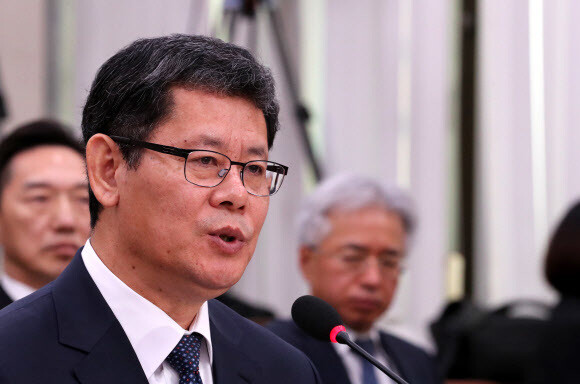hankyoreh
Links to other country sites 다른 나라 사이트 링크
Unification Minister nominee stresses need for resumption of North Korea-US dialogue

Minister of Unification nominee Kim Yeon-chul stressed the need for “continued improvements to inter-Korean relations” in order to “promote the resumption of North Korea-US dialogue and drive the establishment of permanent peace.”
Speaking at his confirmation hearing before the National Assembly Foreign Affairs and Unification Committee on Mar. 26, Kim said he intends to “look for creative ways of helping North Korea and the US meet again quickly and find common ground.”
Stressed that North Korea “fundamentally cannot have both nuclear weapons and a functioning economy at the same time,” Kim stressed the need to “use the North’s strategy of focusing on economic development as an element to hasten denuclearization.”
He went on to say he would “look for different approaches” as Minister of Unification, including a Cooperative Threat Reduction (CTR) program rather than the current coercive approach to denuclearization. The CTR approach, he explained, “resolves issues at the source by dismantling nuclear and missile facilities and substituting them with industry in those regions.” He also pledged to “establish a positive feedback loop between peace and the economy.”
Kim also said it was “quite noteworthy in itself” that the recent North Korea-US summit in Hanoi included discussions of so-called “snapback” provisions, which would allow the lifting of sanctions but restore them in the event of a violation by the North.
“The North has stated its willingness to abandon [the nuclear facilities at] Yongbyon, and it is being reported that the US may consider [the establishment of] a liaison office, an end-of-war declaration, and a snapback provision,” he said.
“In light of all these things, I think it may be possible to establish a new plan,” he added.
The ruling and opposition parties remain sharply divided over Kim’s proposed policy course. Lawmakers with the ruling Democratic Party lauded Kim as a “top expert,” while opposition lawmakers Choung Byoung-gug from the Bareunmirae Party and Kim Moo-sung from the Liberty Korea Party (LKP) respectively denounced him as a “North Korea mouthpiece” and “pro-Pyongyang.”
In his opening statement, Kim addressed the controversy over his somewhat coarse past statements on social media expressing his political and policy views.
“I would like to apologize deeply for having wounded the feelings of others,” he said.
In spite of this, opposition lawmakers continued their attack, with LKP lawmaker Chun Jin-suk describing Kim’s mental state as “not normal.” On the ruling party side, lawmakers Song Young-gil and Lee In-young pleaded with Kim to “behave cautiously.” Opposition lawmakers also continued to attack Kim’s past remarks concerning the shooting of South Korean tourist Park Wang-ja at the Mt. Kumgang resort and the sinking of the ROKS Cheonan.
Meanwhile, LKP lawmaker Yoo Ki-june focused questions on whether Kim and his wife had signed several so-called “down contracts” prior to the 2006 institution of the real estate actual transaction reporting system. Kim acknowledged the allegations, saying he had “not tended to things closely before 2006” and was “deeply remorseful.”
By Lee Je-hun, senior staff writer, and Noh Ji-won, staff reporter
Please direct comments or questions to [english@hani.co.kr]

Editorial・opinion
![[Editorial] Korea must respond firmly to Japan’s attempt to usurp Line [Editorial] Korea must respond firmly to Japan’s attempt to usurp Line](https://flexible.img.hani.co.kr/flexible/normal/500/300/imgdb/original/2024/0514/2317156736305813.jpg) [Editorial] Korea must respond firmly to Japan’s attempt to usurp Line
[Editorial] Korea must respond firmly to Japan’s attempt to usurp Line![[Editorial] Transfers of prosecutors investigating Korea’s first lady send chilling message [Editorial] Transfers of prosecutors investigating Korea’s first lady send chilling message](https://flexible.img.hani.co.kr/flexible/normal/500/300/imgdb/original/2024/0514/7917156741888668.jpg) [Editorial] Transfers of prosecutors investigating Korea’s first lady send chilling message
[Editorial] Transfers of prosecutors investigating Korea’s first lady send chilling message- [Column] Will Seoul’s ties with Moscow really recover on their own?
- [Column] Samsung’s ‘lost decade’ and Lee Jae-yong’s mismatched chopsticks
- [Correspondent’s column] The real reason the US is worried about Chinese ‘overcapacity’
- [Editorial] Yoon’s gesture at communication only highlights his reluctance to change
- [Editorial] Perilous stakes of Trump’s rhetoric around US troop pullout from Korea
- [Guest essay] Preventing Korean Peninsula from becoming front line of new cold war
- [Column] The state is back — but is it in business?
- [Column] Life on our Trisolaris
Most viewed articles
- 1Ado over Line stokes anti-Japanese sentiment in Korea, discontent among Naver employees
- 2[Column] Samsung’s ‘lost decade’ and Lee Jae-yong’s mismatched chopsticks
- 3Korean opposition decries Line affair as price of Yoon’s ‘degrading’ diplomacy toward Japan
- 4US has always pulled troops from Korea unilaterally — is Yoon prepared for it to happen again?
- 5Korean auto industry on edge after US hints at ban on Chinese tech in connected cars
- 6[Editorial] Yoon’s gesture at communication only highlights his reluctance to change
- 7[Correspondent’s column] The real reason the US is worried about Chinese ‘overcapacity’
- 8[Column] Will Seoul’s ties with Moscow really recover on their own?
- 9[Photo] Korean students protest US complicity in Israel’s war outside US Embassy
- 101 in 3 S. Korean security experts support nuclear armament, CSIS finds